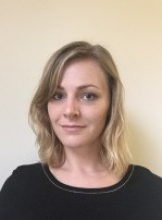
Ph.D. Candidate
Albert F. Yee Laboratory
Chemical and Biomolecular Engineering Department
UC Irvine
Abstract: Upwards of 2 million people in the developing world are blinded by corneal ulcers. The majority are caused by corneal abrasions, which are subsequently contaminated by opportunistic microbes. Blinding corneal infections (keratitis) are traditionally treated with costly antifungals and antibiotics that have a poor visual outcome and may lead to antimicrobial resistance. This leads to the development of antimicrobial surfaces, which aim to limit the spread of microbes in the first place. The Yee group has developed a prophylactic ocular bandage with an antimicrobial surface to decrease the cases of blinding keratitis. Heedy's talk will focus on work from the Yee group, which combines the two main approaches to producing an antimicrobial surface: using an antimicrobial material and topographical nanopatterns. The combination of these two antimicrobial strategies is found to synergistically inhibit growth of the pathogenic fungi Fusarium oxysporum and bacteria Pseudomonas aeruginosa.
Bio: Sara Heedy is a Ph.D. candidate in the Yee Lab in the Department of Chemical and Biomolecular Engineering. Her research interests include interfacial interactions and nanoconfinement of biopolymers. She enjoys her role as a lab assistant at IMRI. Outside of the lab, she enjoys teaching yoga, surfing and cycling.
Share
Upcoming Events
-
MSE 298 Seminar: Mechano-Electrochemical Phenomena at Ceramic Electrolyte Interfaces
-
CBE 298 Seminar: Beyond the Tailpipe - From the Science of Soot Formation to the Engineering of Carbon Nanomaterials
-
MSE 298 Seminar: Innovation In Materials Science - An Industrial R&D Perspective
-
MSE 298 Seminar: Understanding the Impact of Grain Boundary Inclination on Grain Growth Using Modeling and Simulation and Experiments
-
EECS Seminar: Mixed Conductors for Bioelectronics
